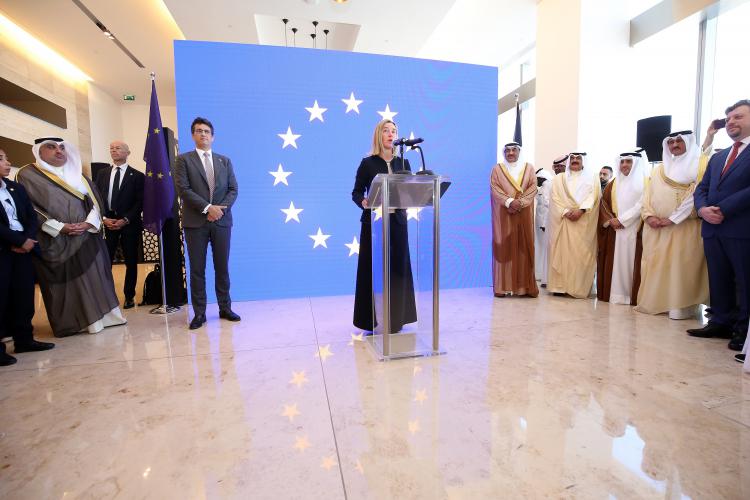- Negotiations

The European Union and the Gulf Cooperation Council signed an Economic Cooperation Agreement in 1988 which laid the framework for the elaboration of a bilateral free trade agreement between the two regional blocs. Formal negotiations began in 1990 and are still not concluded.
While the EU has powerful economic interests in liberalising investment rules in the Gulf States, so that EU corporations may participate directly in the region’s oil, banking, telecoms, port services and other industries, political issues have been publically blamed for blocking agreement. These include demands from the EU with regards to fulfilling standards of democracy and human rights, as well as clauses on cooperation against terrorism and weapons of mass destruction. Human rights groups, such as the International Federation for Human Rights, have urged the EU to insist on respect for freedom of press, women’s rights and labour rights of migrant workers in the Gulf countries in return for any trade concessions granted through the FTA.
At the end of 2008, the GCC formally announced it was suspending the trade talks due to the EU’s insistence on political demands.
last update: May 2012
photo: European External Action Service - EEAS/CC BY-NC 2.0
6-May-2009
A former Qatari minister yesterday lambasted Western “hypocrisy” and “double standards” when it came to free trade agreements (FTAs) with smaller nations. And he maintained that the GCC-US FTA was a thing of the “past”.
6-May-2009
Gulf Weekly
Free trade talks between the GCC and the European Union have been suspended again after the two sides failed to reach an agreement on human rights and customs duties on GCC exports to Europe.
29-Apr-2009
Reuters
A proposed trade deal between Canada and the European Union puts pressure on the United States to begin thinking about its own trade pact with Europe, U.S. manufacturers said on Tuesday.
29-Apr-2009
Gulf News
The European Union and the Gulf Cooperation Council’s Joint Council meet today at the Al Bustan Palace Hotel to put on track the Free Trade Agreement talks that were derailed by the GCC last December.
12-Apr-2009
Easy Bourse
The Gulf Cooperation Council chief and Saudi and Omani ministers on Sunday discussed how to revive talks on a free trade accord with the European Union that broke down in December
29-Jan-2009
Gulof News
The demands which stood as obstacles to signing an EU-GCC FTA are non-commercial demands, although GCC countries made a great leap in updating and modernising economic and commercial laws in the past years, thinking this would meet EU requirements in this respect.
6-Jan-2009
Emirates Business 24/7
Gulf oil producers have accused their main economic partner the European Union (EU) of lacking interest in signing the long-sought free trade deal as it shifts interest to partners in East Europe.
29-Dec-2008
Gulf News
A disagreement over human rights and democracy was behind the suspension earlier this month of trade talks between the Gulf Cooperation Council and the European Union, an Omani official said yesterday.
24-Dec-2008
Khaleej Times
The Gulf Cooperation Council (GCC) on Tuesday said it had suspended talks with the European Union for a free trade agreement (FTA). The decision to halt more than two decades of hard negotiations between the two regional economic blocs to sign the world’s first region-to-region free trade agreement came a week ahead of a crucial summit by GCC leaders in Muscat.
16-Dec-2008
AFP
Qatar warned on Monday that the six-nation Gulf Cooperation Council would suspend talks on a free trade deal with the European Union if an impasse in the 20-year-old negotiations continues.





